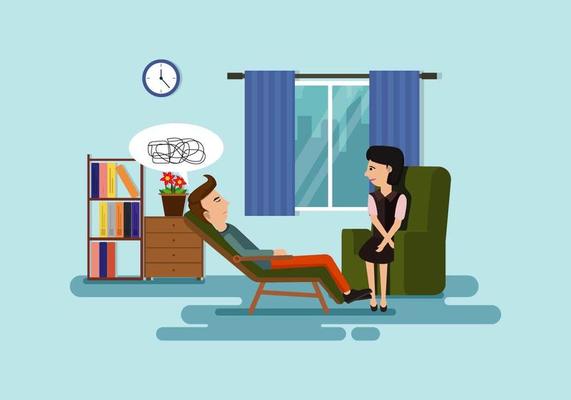The Function of Psych Treatment in Managing Stress And Anxiety and Anxiety
Psychotherapy has arised as a keystone in the administration of anxiety and depression, supplying tailored interventions that range from Cognitive-Behavioral Treatment (CBT) to mindfulness-based strategies. These strategies not just help people in recognizing and restructuring negative idea patterns however likewise foster present-moment recognition, minimizing the propensity to ruminate.
Comprehending Stress And Anxiety and Depression
Comprehending anxiousness and anxiety calls for a comprehensive look at these widespread psychological health conditions, which commonly exist together and considerably influence an individual's daily life. Conversely, depression shows up as a prevalent feeling of sadness, emptiness, or sadness, frequently come with by a loss of rate of interest in formerly enjoyed activities, changes in appetite, and sleep disturbances.
The conjunction of anxiousness and anxiety can exacerbate signs and symptoms and complicate diagnosis and therapy. Individuals dealing with both conditions might experience a lot more severe signs, better disability in work and social functioning, and a much longer duration of disease. This comorbidity necessitates a nuanced understanding and technique to treatment.
Neurobiological aspects such as natural chemical discrepancies, genetic tendencies, and ecological stressors add to the growth and maintenance of these problems. Furthermore, cognitive patterns like unfavorable thinking and maladaptive habits can bolster these conditions. Recognizing the detailed interplay of these variables is crucial for effective treatment. Comprehensive evaluation by psychological wellness professionals is important to recognize the presence and degree of these problems, leading the way for tailored restorative approaches.
Kinds Of Psychotherapy
Psychiatric therapy, likewise referred to as talk treatment, incorporates a variety of treatment modalities made to alleviate signs and symptoms of anxiousness and clinical depression by addressing the underlying emotional and mental problems. Various kinds of psychotherapy are tailored to fulfill the one-of-a-kind needs of people, supplying a variety of methods to psychological wellness care.
One extensively used type is psychodynamic treatment, which concentrates on understanding and fixing subconscious conflicts stemming from very early life experiences. By checking out these ingrained issues, clients gain understanding into their existing behavior and mood.
Social Therapy (IPT) is an additional efficient technique that concentrates on boosting interpersonal relationships and social operating to lower depressive symptoms. It normally deals with issues such as pain, function transitions, and social disputes.
Humanistic therapies, such as Client-Centered Treatment, highlight individual growth and self-actualization. Best Psychologist in Delhi. These techniques create an encouraging environment where individuals can discover their feelings and create a more powerful sense of self
Finally, Dialectical Actions Therapy (DBT) incorporates cognitive-behavioral techniques with mindfulness techniques. Initially developed for borderline character problem, DBT has actually been adjusted to deal with stress and anxiety and clinical depression by teaching abilities in distress tolerance, psychological regulation, and interpersonal performance.
These diverse psychotherapeutic strategies provide numerous paths to mental wellness and well-being, providing to specific choices and therapeutic requirements.
Cognitive-Behavioral Therapy (CBT)
Among the different psychotherapeutic modalities, Cognitive-Behavioral Treatment (CBT) sticks out for its structured, goal-oriented method in treating anxiousness and anxiety. Established by Aaron T. Beck in the 1960s, CBT is asserted on the principle that maladaptive reasoning patterns contribute substantially to psychological distress and behavior concerns. By identifying and reorganizing these unfavorable thought patterns, CBT aims to ease signs and symptoms and foster healthier cognitive procedures.
The treatment encompasses a variety of techniques, consisting of cognitive restructuring, direct exposure treatment, and behavior activation. Cognitive restructuring focuses on challenging and modifying altered cognitions, while exposure therapy progressively acclimates people to anxiety-provoking stimuli, lowering evasion habits.
Empirical evidence emphasizes the efficiency of CBT, with many studies showing its efficiency in minimizing signs of anxiety and clinical depression. This restorative approach has actually been adapted for numerous populations and setups, verifying versatile and versatile. Its structured nature, empirical support, and focus on ability acquisition make CBT a keystone in the psychotherapeutic treatment of anxiousness and clinical depression.
Mindfulness-Based Methods
Mindfulness-Based Strategies have amassed considerable focus in recent years as reliable treatments for anxiousness and depression. Rooted in old reflection practices, these methods aim to grow an enhanced awareness of today minute, which can help people disengage from the ruminative thought patterns usually related to stress and anxiety and depressive conditions.

Similarly, Mindfulness-Based Cognitive Therapy (MBCT) integrates concepts from Cognitive-Behavioral Treatment (CBT) with mindfulness approaches. MBCT is specifically efficient in preventing relapse in people with recurrent clinical depression. By acknowledging very early caution indications of depressive episodes, individuals learnt MBCT can apply mindfulness practices to alleviate the start of full-on episodes.
Advantages of Psychotherapy
Numerous research studies have actually shown the profound advantages of psychotherapy for people grappling with stress and anxiety and anxiety. Psychiatric therapy furnishes clients with dealing techniques to take care of stressful emotions, consequently reducing signs and symptoms of anxiety and depression.
Furthermore, psychiatric therapy provides an organized setting for self-exploration and understanding. By reviewing their experiences and feelings with an experienced therapist, people can uncover underlying concerns adding to their mental wellness struggles. This self-awareness is an essential action toward long-lasting recovery and durability.
An additional considerable advantage is the improvement of interpersonal abilities. Anxiousness and anxiety often strain partnerships, leading to isolation. With therapeutic interventions, individuals find out reliable interaction and conflict-resolution skills, which can boost their communications and foster supportive connections.
In addition, psychiatric therapy supplies a customized technique to therapy. Ultimately, the benefits of psychotherapy extend past signs and symptom alleviation, adding to general wellness and high quality of life.

Verdict
Psychiatric therapy significantly adds to the management of stress and anxiety and anxiety by using efficient like it coping strategies and a protected atmosphere for self-exploration. Strategies such as Cognitive-Behavioral Therapy (CBT) and mindfulness-based methods contribute in identifying and restructuring negative idea patterns, while advertising present-moment understanding. These tailored interventions not just relieve symptoms but also boost psychological guideline and interpersonal skills, visit this site thus improving total wellness and lifestyle for individuals dealing with these mental health obstacles.
Psychotherapy has arised as a foundation in the administration of anxiety and clinical depression, using tailored treatments that range from Cognitive-Behavioral Treatment (CBT) to mindfulness-based methods.Understanding anxiousness and anxiety calls for a comprehensive appearance at these prevalent psychological health problems, which typically exist side-by-side and substantially impact a person's daily life.Among the numerous psychotherapeutic modalities, Cognitive-Behavioral Treatment (CBT) stands out for its structured, ambitious technique in dealing with stress and anxiety and anxiety.Many studies have actually shown the extensive benefits of psychotherapy for people grappling with anxiety and depression. Psychotherapy equips people with coping methods to handle upsetting feelings, thereby minimizing signs and symptoms of anxiety and clinical depression.